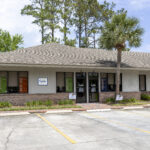Welcome to the dynamic world of commercial real estate in Jacksonville, FL – a city that is steadily emerging as one of the hottest markets in the United States. With its strategic location, thriving economy, and an ever-growing population, Jacksonville offers a myriad of opportunities for investors, entrepreneurs, and businesses looking to make their mark. In this article, we will delve into the key factors that make Jacksonville an attractive destination for commercial real estate ventures. From the bustling downtown district to the vibrant suburban areas, we will explore the diverse range of properties available, including office spaces, retail centers, industrial facilities, and more. As we unlock the potential of Jacksonville’s commercial real estate market, we will navigate through the exciting landscape, uncovering the latest trends, investment strategies, and success stories that have shaped this thriving industry. Whether you are a seasoned investor or a newcomer to the commercial real estate scene, join us on this journey as we uncover the secrets to success in Jacksonville’s commercial real estate market.
Overview of the current market trends and growth opportunities
Jacksonville’s commercial real estate market is experiencing a significant surge in growth and development. The city’s strategic location along the Atlantic coast, coupled with its excellent transportation infrastructure, has attracted numerous businesses and investors. The market is witnessing an influx of new businesses, creating a demand for commercial properties across various sectors. The steady population growth, fueled by a strong job market and a desirable quality of life, further contributes to the increasing demand for commercial real estate.
The office sector in Jacksonville is experiencing substantial growth, with a rise in demand for modern and flexible workspaces. The city’s vibrant downtown area is a hub for businesses, offering a mix of high-rise office buildings and trendy coworking spaces. As more companies choose Jacksonville as their base of operations, the demand for office space continues to rise. Additionally, the retail sector is flourishing, with new shopping centers and mixed-use developments popping up across the city. Jacksonville’s growing population and strong consumer spending power contribute to the success of the retail sector.
Factors driving the growth of the commercial real estate market in Jacksonville, FL
Several factors contribute to the growth and attractiveness of Jacksonville’s commercial real estate market. The city’s strategic location, situated at the crossroads of major highways and with easy access to ports and airports, makes it an ideal logistics and distribution hub. This advantageous position attracts businesses in industries such as manufacturing, warehousing, and e-commerce, driving the demand for industrial and commercial properties.
Furthermore, Jacksonville’s robust economy and favorable business climate make it an attractive destination for companies and investors. The city boasts a diverse economy, with key sectors including healthcare, finance, technology, and tourism. Jacksonville’s pro-business policies, low taxes, and skilled workforce create a conducive environment for business growth and investment. These factors, combined with the city’s affordable cost of living, make Jacksonville an appealing choice for companies looking to expand or relocate.
Key sectors within the commercial real estate market in Jacksonville, FL
Jacksonville’s commercial real estate market comprises various sectors, each with its own unique opportunities and dynamics. The office sector, as mentioned earlier, is experiencing significant growth, driven by the demand for modern and flexible workspaces. The city’s downtown district is a prime location for office spaces, with a mix of high-rise buildings that offer stunning views of the St. Johns River.
The retail sector in Jacksonville is also thriving, thanks to the city’s growing population and strong consumer spending power. From upscale shopping centers to neighborhood plazas, Jacksonville offers a diverse range of retail spaces to cater to different demographics and markets. The city’s vibrant suburban areas are particularly attractive for retail businesses, with a steady flow of residents and potential customers.
Another key sector within Jacksonville’s commercial real estate market is industrial properties. The city’s strategic location and excellent transportation infrastructure make it an ideal hub for manufacturing, warehousing, and logistics operations. Industrial facilities in Jacksonville range from large distribution centers to smaller warehouse spaces, catering to the diverse needs of businesses in various industries.
Investment opportunities in the commercial real estate market in Jacksonville, FL
Investing in Jacksonville’s commercial real estate market presents a plethora of opportunities for investors seeking attractive returns. The city’s rapid growth and development create a favorable environment for property appreciation and rental income. The office sector, in particular, offers promising investment opportunities, with the increasing demand for high-quality office spaces in prime locations.
Retail properties also provide excellent investment potential, especially in the city’s bustling suburban areas. The growth in population and consumer spending power ensures a steady flow of customers, making retail spaces a lucrative investment option. Additionally, the industrial sector offers attractive opportunities, given Jacksonville’s status as a logistics and distribution hub. Investors can capitalize on the demand for modern industrial facilities and warehouses, catering to businesses in various sectors.
Top commercial real estate development projects in Jacksonville, FL
Jacksonville is witnessing a wave of commercial real estate development projects that are transforming the city’s skyline and enhancing its economic landscape.
The Jacksonville Shipyards, a vibrant new development, is set to breathe life into a once sleepy riverfront area. Anticipated to reach completion in 2026, this ambitious project encompasses a plethora of exciting additions. Among them, a luxurious 176-room Four Seasons Hotel, a marina, residential and office spaces, and captivating visitor attractions. Notably, the current Museum of Science & Industry will relocate from the river’s south bank to a spacious new facility within the Shipyards, accompanied by the debut of the Jacksonville Naval Museum.
Adding to the allure, a seamless network of outdoor spaces and parks, including a generous 6,500-square-foot events lawn, will gracefully unite all these elements into a harmonious whole. This transformation promises to revitalize the area, turning it into a bustling and dynamic destination for locals and visitors alike.
Another notable project is the ambitious redevelopment of the Jacksonville Landing, a waterfront shopping and entertainment complex located downtown. The project aims to revitalize the area, creating a vibrant mixed-use space with retail, dining, and entertainment options.
Finally, a significant development project is the proposed Jacksonville Riverfront Convention Center. This state-of-the-art facility aims to attract large-scale conventions, conferences, and events, further boosting the city’s tourism and hospitality industry. The convention center will be complemented by hotels, restaurants, and retail spaces, creating a dynamic destination along the St. Johns River.
Challenges and risks in the commercial real estate market in Jacksonville, FL
While Jacksonville’s commercial real estate market offers immense potential, it is not without its challenges and risks. One of the primary challenges is competition. As the market continues to grow, more investors and businesses are entering the scene, leading to increased competition for prime properties and tenants. It is crucial for investors to conduct thorough market research and due diligence to identify opportunities that align with their investment goals.
Another risk to consider is market volatility. Like any real estate market, Jacksonville’s commercial sector is susceptible to economic fluctuations and external factors. It is essential for investors to adopt a long-term perspective and have contingency plans in place to mitigate potential risks. Working with experienced professionals, such as real estate brokers and property managers, can provide valuable insights and guidance in navigating the market.
Tips for navigating the commercial real estate market in Jacksonville, FL
Navigating the commercial real estate market in Jacksonville requires careful planning and strategic decision-making. Here are some tips to help investors make the most of their ventures:
1. Conduct thorough market research: Understand the current market trends, demand-supply dynamics, and rental rates of different property types. This knowledge will guide your investment decisions and help you identify opportunities that align with your investment goals.
2. Build a network: Establish relationships with local real estate professionals, such as brokers, property managers, and developers. They can provide valuable insights, access to off-market deals, and assistance in navigating the market.
3. Diversify your portfolio: Consider investing in different sectors within the commercial real estate market, such as office, retail, and industrial properties. Diversification helps mitigate risk and provides opportunities for stable cash flow and capital appreciation.
4. Stay updated with local regulations: Familiarize yourself with zoning regulations, permits, and licensing requirements in Jacksonville. Compliance with local laws is crucial when acquiring, developing, or leasing commercial properties.
5. Partner with experienced professionals: Seek guidance from professionals who specialize in commercial real estate investment. They can provide expertise in property valuation, deal structuring, and market analysis, ensuring that you make informed investment decisions.
Important considerations for commercial real estate investors in Jacksonville, FL
When investing in commercial real estate in Jacksonville, it is essential to consider several factors to maximize your chances of success. Here are some key considerations for investors:
1. Location: Choose properties in prime locations that offer access to transportation, amenities, and a target customer base. Proximity to major highways, airports, and ports can significantly impact the success of commercial properties.
2. Market demand: Analyze the demand for different property types in Jacksonville. Consider factors such as population growth, job market, and industry trends to identify sectors with strong rental demand and potential for growth.
3. Financial analysis: Conduct a thorough financial analysis of potential investments, including cash flow projections, operating expenses, and potential risks. Consider factors such as vacancy rates, lease terms, and maintenance costs to assess the profitability of the investment.
4. Long-term perspective: Commercial real estate investments often require a long-term commitment. Consider your investment horizon and exit strategies, ensuring that your investment aligns with your financial goals and risk tolerance.
Conclusion: The future outlook of the commercial real estate market in Jacksonville, FL
Jacksonville’s commercial real estate market is poised for continued growth and success. The city’s strategic location, thriving economy, and diverse industries create a favorable environment for investors and businesses. With ongoing development projects, increasing demand for office, retail, and industrial properties, and a pro-business climate, Jacksonville offers a wealth of opportunities for commercial real estate ventures.
As the city’s population continues to grow, fueled by job opportunities and a desirable quality of life, the demand for commercial properties is expected to rise. Investors who are proactive, well-informed, and willing to adapt to market trends will find ample opportunities to unlock the potential of Jacksonville’s commercial real estate market.
Whether you are a seasoned investor looking to expand your portfolio or a newcomer to the real estate scene, Jacksonville offers a dynamic and lucrative market to explore. By understanding the market trends, leveraging the city’s strengths, and making informed investment decisions, you can position yourself for success in Jacksonville’s thriving commercial real estate industry.
—
*Disclaimer: The information provided in this article is for informational purposes only and should not be considered as financial or investment advice. It is recommended to consult with a professional advisor before making any investment decisions. *
IMC is dedicated to helping you reach your goals by providing you with the resources and knowledge you need to succeed. Contact us with any questions at solutions@imc-jax.com.
Want new articles before they get published? Subscribe to our Newsletter. We make commercial real estate easy. International Management Company, LLC Home
About Us
Properties
News & Blog
Contact Us
Tenant Portallinkedinfacebookinstagramtwitter


